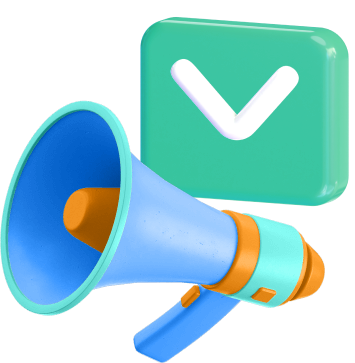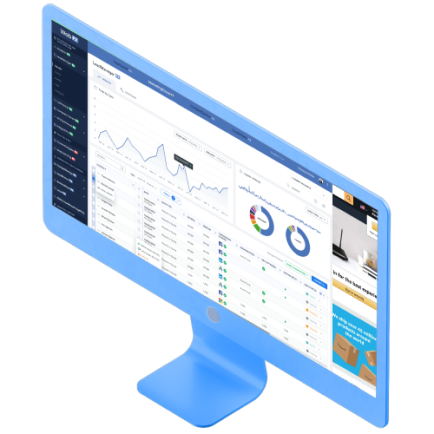-
 Published: May 13, 2023
Published: May 13, 2023
-
 5 min. read
5 min. read
-
 Matthew Gibbons
Matthew Gibbons Lead Data & Tech Writer
Lead Data & Tech Writer
- Matthew is a marketing expert focusing on the SEO & martech spaces. He has written over 500 marketing guides and video scripts for the WebFX YouTube channel. When he’s not striving to put out some fresh blog posts and articles, he’s usually fueling his Tolkien obsession or working on miscellaneous creative projects.
Marketing and sales are crucial to the success of any business. If you don’t market to people, they won’t buy from you. And if you don’t drive sales, you won’t drive any revenue. But your customer interactions don’t end with marketing and sales. Customer service is equally important.
This is especially true if you’re a company that aims to retain clients over the long term, rather than just driving individual purchases. Keeping in touch with your clients and working to keep them happy will work wonders for the success of your company.
One way to boost your customer service is to use a customer relationship management (CRM) tool. But how does a CRM benefit customer service? Keep reading to find out. Then subscribe to Revenue Weekly — our email newsletter — for more marketing tips!
Join 200,000 smart marketers and get the month’s hottest marketing news and insights delivered straight to your inbox! “*” indicates required fields (Don’t worry, we’ll never share your information!)Don’t miss our Marketing Manager Insider emails!
Enter your email below:
Inline Subscription Form – CTA 72

What is a CRM?
CRM stands for customer relationship management. A CRM platform allows you to gather, store, categorize, and analyze data about your customers. That data could include customer demographics and behavioral data. Many CRMs also come with additional features, like sales automation.
Why do you need a CRM?
Even before customer service enters the picture, a CRM is one of the best tools your business can have. That’s because if you want to improve your marketing and sales, it’s crucial to understand your audience. You need to know who they are, what they want, and which campaigns are most effective for them.
A CRM can help you learn that info. By generating reports on your customer and sales data, it can help you identify the best improvements to make to your campaigns. Plus, CRMs make data analysis far more convenient by centralizing it in a single location that your entire team can access.
Related: CRM Strategy 101: Basics and Steps for Creating One
How does a CRM benefit customer service?
Now that we’ve briefly covered the definition and general benefits of CRMs, let’s come back to our main question: How does a CRM benefit customer service? As it happens, customer service and CRM platforms go hand in hand.
Here are five CRM customer service benefits to be aware of.
1. CRMs show you what your customers actually want and need
One of the biggest ways CRMs benefits customer service is by revealing your customers’ wants and needs. For many businesses, this is a big struggle of customer service — it can be tough to identify what your clients need from you post-purchase.
But with a CRM, you can analyze customer data to identify what your customers most often seek help with and what they’re looking for from your business. You can use that info to more effectively reach your customers and keep them engaged, rather than letting them slip away because you didn’t realize what they needed from you.
2. CRMs personalize customer service
Another CRM customer service benefit is personalization. With in-depth customer data and analytics, you can identify specific segments of your customer base and even hone in on the characteristics of specific clients. That gives you the ability to greatly personalize your customer service to those groups and individuals.
For example, you might segment your audience by location. From there, you might find that customers in one area tend to have a different focus than customers in another area. Using that info, you could personalize your customer service efforts to each group, honing in on the unique focus each one has.
3. CRMs speed up and automate your customer communications
Just like marketing and sales, customer service is all about communicating with your customers. Sometimes, that means responding to specific help requests or inquiries. But other times, it consists more of routine check-ins and mass emails.
For those more generic, mundane communications, a CRM can be extremely helpful. That’s because many CRMs can automate certain communications, like email marketing. You can create emails in advance, and then set your CRM to send them out at certain times or in response to certain actions.
4. CRMs connect your different customer-facing teams
As we’ve mentioned already, CRMs help you centralize your data so that your entire team can access it. That means your CRM is accessible not only to your customer service team, but also to your marketing and sales teams.
Since all three teams contribute data to the platform and share in its reporting and analytics features, a CRM helps get those teams in sync with one another. In particular, it eliminates data silos, which is where individual teams store data without sharing it, causing inconsistencies and redundancies across different teams.
With a CRM, though, you don’t have to worry about that. All of your teams will be on the same page, helping them all be more efficient — including your customer service team.
5. CRMs generate customer service reports
Finally, customer service and CRMs work well together due to CRMs’ ability to generate advanced reports on customer service. You can use your CRM to analyze past customer service efforts and identify which approaches worked and which ones didn’t.
You can then take those insights and apply them to your current customer service strategy, reoptimizing to replicate past successes and avoid past failures. When you do this repeatedly over a long period of time, your customer service strategy will gradually grow more and more effective at engaging and retaining clients.
As a result, you’ll be able to significantly increase your company’s revenue over time.
One platform tracking countless metrics and driving stellar results.Meet MarketingCloudFX:


MarketingCloudFX and Nutshell can boost your customer service to new heights
Now that we’ve shown how a good CRM benefits customer service, you might be ready to look for a CRM for your business. Fortunately, you don’t have to look very far — we can already recommend the perfect option.
Nutshell is a high-quality CRM designed to be user-friendly and efficient. Not only does it come with features like sales automation and custom reporting, but it also comes with the assistance of a top-tier support team that can answer any questions or concerns you may have.
Plus, if you’re interested in getting help with your digital marketing as well, you can partner with WebFX. When you use our proprietary marketing software, MarketingCloudFX, you actually get several free seats in Nutshell as well!
Ready to check out WebFX and Nutshell for yourself? Just call us at 888-601-5359 or contact us online today!
-
 Matthew is a marketing expert focusing on the SEO & martech spaces. He has written over 500 marketing guides and video scripts for the WebFX YouTube channel. When he’s not striving to put out some fresh blog posts and articles, he’s usually fueling his Tolkien obsession or working on miscellaneous creative projects.
Matthew is a marketing expert focusing on the SEO & martech spaces. He has written over 500 marketing guides and video scripts for the WebFX YouTube channel. When he’s not striving to put out some fresh blog posts and articles, he’s usually fueling his Tolkien obsession or working on miscellaneous creative projects. -

WebFX is a full-service marketing agency with 1,100+ client reviews and a 4.9-star rating on Clutch! Find out how our expert team and revenue-accelerating tech can drive results for you! Learn more
Try our free Marketing Calculator
Craft a tailored online marketing strategy! Utilize our free Internet marketing calculator for a custom plan based on your location, reach, timeframe, and budget.
Plan Your Marketing Budget

Maximize Your Marketing ROI
Claim your free eBook packed with proven strategies to boost your marketing efforts.
Get the GuideTry our free Marketing Calculator
Craft a tailored online marketing strategy! Utilize our free Internet marketing calculator for a custom plan based on your location, reach, timeframe, and budget.
Plan Your Marketing Budget





